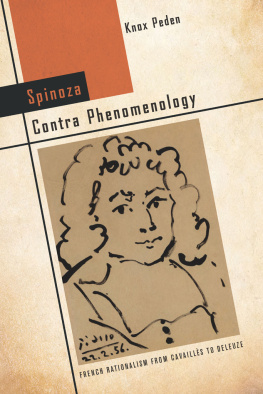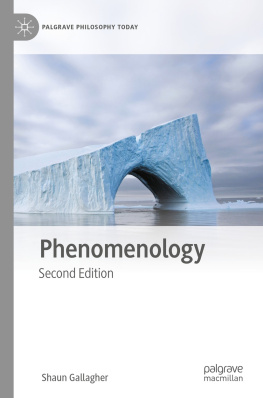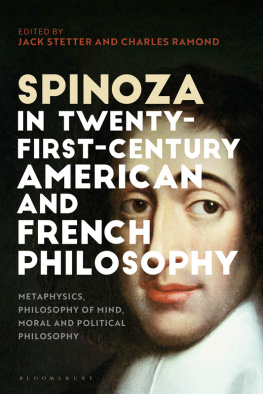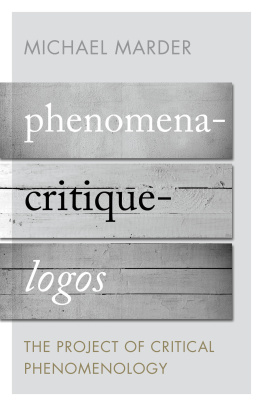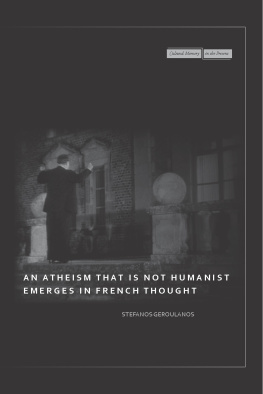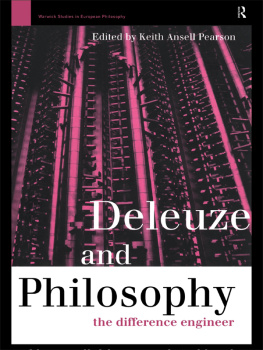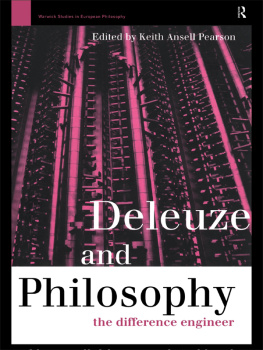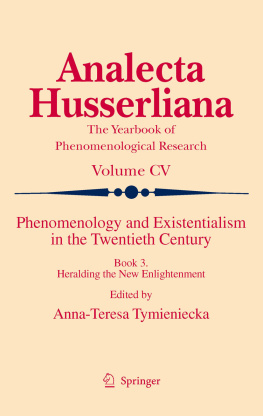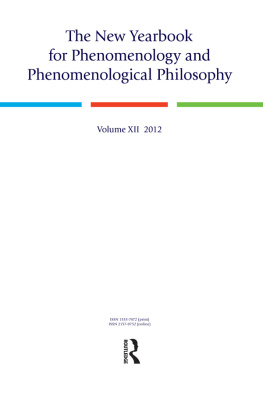Cultural Memory in the Present
Hent de Vries, Editor
SPINOZA CONTRA PHENOMENOLOGY
French Rationalism from Cavaills to Deleuze
Knox Peden
STANFORD UNIVERSITY PRESS
STANFORD, CALIFORNIA
Stanford University Press
Stanford, California
2014 by the Board of Trustees of the Leland Stanford Junior University.
All rights reserved.
No part of this book may be reproduced or transmitted in any form or by any means, electronic or mechanical, including photocopying and recording, or in any information storage or retrieval system without the prior written permission of Stanford University Press.
Printed in the United States of America on acid-free, archival-quality paper
Library of Congress Cataloging-in-Publication Data has been requested.
ISBN 978-0-8047-8741-3 (cloth)
ISBN 978-0-8047-9134-2 (pbk.)
ISBN 978-0-8047-9136-6 (electronic)
Typeset by Bruce Lundquist in 11/13.5 Adobe Garamond
Contents
Acknowledgments
Work on this book has taken me from California to Australia by way of France, and I have accumulated a number of debts along the way. Material support at Berkeley came from the Department of History, the Institute of European Studies, and the Mabelle McLeod Lewis Memorial Fund. Carla Hesse and David Bates were judicious readers and encouraging interlocutors throughout the project. I am pleased to join a chorus of students who express gratitude for the distinctive blend of probity, severity, and above all generosity that Martin Jay brings to the task of advising. Amid all the talk of the crisis of the humanities, his contribution to the debate in a July 2013 edition of the Daily Cal also expresses something of the model of intellectual history he promotes, one grounded in ruthless self-scrutiny and an appreciation of the benefits that accrue when you cherish what you criticize.
Beyond Berkeley, three mentors share a measure of responsibility for this book. Monty Holamon set me on this path when he took me to Paris in 1994 along with other classmates in French, and he ensured that the path would be absurd when he cast me as Pa Ubu in a production of Alfred Jarrys Ubu plays the next year. At Penn, Marc Trachtenberg introduced me to the tasks, protocols, and joys of historical scholarship. My interests have taken me afield from the diplomatic history that I studied with him, but his lessons about how to read criticallyand to think historicallyhave proved foundational for all of my work. Though I knew him for only several months, the last of his life as it turned out, Richard Popkin shaped my thinking about the history of philosophy and helped me realize that, especially when it comes to Spinoza, skepticism and enthusiasm are not antithetical sentiments but in fact prerequisites of one another.
The bulk of the research for this project was conducted in France, and it is a pleasure to acknowledge the librarians and archivists who assisted my efforts at the Bibliothque nationale de France, the cole Normale Suprieure at rue dUlm, the Institut dditions de memoire contemporaine in Caen, and the Institut Desanti at the cole Normale SuprieureLHS in Lyon. I am also grateful to the scholars who took time to discuss this project with me. My chief debt is to Chantal Jaquet, who, in addition to indulging my earliest musings on this subject, wrote a letter of recommendation that helped me secure a Chateaubriand Fellowship to support my time in Paris. Others who met with me in cafs and bureaus to discuss Spinozas rationalism include Alain Badiou, tienne Balibar, Pierre Cassou-Nogus, Pierre Macherey, Pierre-Franois Moreau, Bernard Pautrat, and Frdric Worms. Hourya Sinaceur read my chapter on Cavaills with a discerning eye and gave fruitful advice on how to approach his philosophy of mathematics. I thank Vincent Gerard and Dominique Pradelle for welcoming me to their reading group of Desantis Idalits mathmatiques, and remain grateful to Dominique Desanti for responding to my queries about her husbands life and work. I was saddened to learn of her death in 2011 and am honored that Christine Gom has authorized a treasure from the Desantis estate to serve as the cover for this book. Michel Tort kindly permitted the reproduction of a sketch he likely had no idea had been preserved. A special word of thanks is due Quentin Meillassoux for alerting me to an interview with Jean-Luc Marion in Le Monde.
The book was completed during my time as a postdoctoral research fellow in the Centre for the History of European Discourses (CHED) at the University of Queensland (UQ), and I am grateful to the Faculty of Arts for so generously supporting my work through the UQ postdoctoral fellowship scheme. I am also pleased to thank the two directors of the center I have known, Peter Cryle and Peter Harrison, along with my colleagues at CHED, for creating such an impossibly ideal venue for research in European intellectual history in its myriad forms.
The final draft of the manuscript benefited enormously from the insightful remarks and initially anonymous criticisms that Stanford University Press solicited from Samuel Moyn and Peter Gordon. I am grateful to Emily-Jane Cohen at Stanford for her support for the project and helpful advice, as well as to Hent de Vries for including the book in a series I have long admired. Emily Smiths diligence and patience have been instrumental in turning the manuscript into a book, and the sharp eyes and sound advice of my copyeditor Cynthia Lindlof have spared me much embarrassment.
For a publication that has been so long in the making, I have naturally accumulated a sizable debt to friends and colleagues who have discussed this project with me in various settings. There is not spacein this book or my memoryto name them all, but I am happy to acknowledge the audiences who responded to my claims at the following institutions: the Australian National University, the University of New South Wales, the University of Queensland, the annual meeting of the Australasian Society for Continental Philosophy, the Consortium for Intellectual and Cultural History at CUNY, the cole Normale Suprieure, the annual meeting of the American Comparative Literature Association, Cornell University, and the Centre for Research in Modern European Philosophy in London.
Among the many friends who have supported my work, a handful read portions of the book and responded with invaluable criticism and feedback. A special acknowledgment on this score is due Nathan Brown, who read the initial manuscript in one heroic sitting and expressed an enthusiasm for the project that has sustained me in periods of heightened skepticism. My debt is no less great to these other readers who responded to various sections of the book: Ed Baring, Giuseppe Bianco, Ray Brassier, Marija Cetinic, Stefanos Geroulanos, G. M. Goshgarian, Martin Hgglund, Peter Hallward, Ian Hesketh, Ian Hunter, Rob Lehman, Ozren Pupovac, Joel Revill, Audrey Wasser, and Ben Wurgaft. This book would not be the reality it is without the critical advice of these readers. And despite Spinozas contention that perfection and reality are one and the same, its imperfections are still my doing.
Some readers will recognize that the title of this book pays homage to Gillian Roses classic Hegel Contra Sociology. Though I admire many things about Roses book, in particular her focus on the persistence of neo-Kantianism in European thought and her insistence on the value of speculative philosophy, this homage also includes an emotional component. In 1991, three years before Rose died from ovarian cancer at the age of forty-eight, and thirteen years before I even knew who she was, my mother died at the age of forty-nine in similar circumstances. I have read enough Lacan to appreciate that the acknowledgment of a debt typically does not go without a measure of transference, and Im happy to be explicit about that here. Im also pleased to experience the merits of Spinozas insistence that our affective inclinations acquire a richer meaning when we seek to form an adequate idea of them.
Next page
